- Clone
- 2.11 (See other available formats)
- Regulatory Status
- RUO
- Other Names
- T cell receptor Vgamma 1.1, TCR Vγ1 (Tonegawa nomenclature), TCR Cr4, TRGV1, GV5S1
- Isotype
- Armenian Hamster IgG
- Ave. Rating
- Submit a Review
- Product Citations
- publications
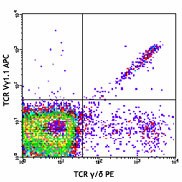
-

C57BL/6 mouse lymph node cells were stained with TCR γ/δ PE and TCR Vγ1.1 (clone 2.11) APC (top) or Armenian hamster IgG APC isotype control (bottom). -

| Cat # | Size | Price | Quantity Check Availability | Save | ||
|---|---|---|---|---|---|---|
| 141107 | 25 µg | 105€ | ||||
| 141108 | 100 µg | 233€ | ||||
T cell receptor (TCR) is a heterodimer consisting of an α and β chain (TCR α/β) or a γ and δ chain (TCR γ/δ). TCR associates with CD3 to form a CD3/TCR complex. The CD3/TCR plays a key role in antigen recognition, signal transduction, and T cell activation. TCR Vγ1.1 (Garman nomenclature) is also called TCR Vγ1 (Tonegawa nomenclature). The Vγ1 gene almost exclusively rearranges to the Jγ4-Cγ4 gene. Vγ1- Jγ4-Cγ4 expressing cells constitute a major population of γ/δ T cells in the thymus and peripheral lymphoid organs in adult mice, but they are only composed of a minor population of γ/δ T cells during fetal and early postnatal life. Vγ1 T cell development can happen in thymus-dependent and thymus-independent manners. Further studies have shown that the antibody 2.11 recognizes an epitope located in the Cr4 domain.
Several TCR γ and δ chain nomenclature systems exist. In order to consolidate the various nomenclature systems, we have created charts for corresponding names across some of the most popular naming methods. Click here to see charts.
Product Details
- Verified Reactivity
- Mouse
- Antibody Type
- Monoclonal
- Host Species
- Armenian Hamster
- Immunogen
- T3.13.1 T-cell hybridoma cell line
- Formulation
- Phosphate-buffered solution, pH 7.2, containing 0.09% sodium azide.
- Preparation
- The antibody was purified by affinity chromatography and conjugated with APC under optimal conditions.
- Concentration
- 0.2 mg/ml
- Storage & Handling
- The antibody solution should be stored undiluted between 2°C and 8°C, and protected from prolonged exposure to light. Do not freeze.
- Application
-
FC - Quality tested
- Recommended Usage
-
Each lot of this antibody is quality control tested by immunofluorescent staining with flow cytometric analysis. For flow cytometric staining, the suggested use of this reagent is ≤0.125 µg per million cells in 100 µl volume. It is recommended that the reagent be titrated for optimal performance for each application.
- Excitation Laser
-
Red Laser (633 nm)
- Application Notes
-
Additional reported applications (for the relevant formats) include: immunoprecipitation1.
-
Application References
(PubMed link indicates BioLegend citation) -
- Pereira P, et al. 1995. J. Exp. Med. 182:1921. (IP)
- Pereira P and Boucontet L. 2004. J. Immunol. 173:3261. (FC)
- Pereira P, et al. 1996. Intl. Immunol. 8:83. (FC)
- Product Citations
-
- RRID
-
AB_10901177 (BioLegend Cat. No. 141107)
AB_10901177 (BioLegend Cat. No. 141108)
Antigen Details
- Structure
- Ig superfamily
- Distribution
-
Subset of γ/δ T-cells
- Function
- Antigen recognition
- Ligand/Receptor
- Antigen
- Cell Type
- T cells
- Biology Area
- Adaptive Immunity, Immunology
- Molecular Family
- TCRs
- Antigen References
-
1. Pereira P, et al. 1995. J. Exp. Med. 182:1921.
2. Grigoriadou K, et al. 2002. J. Immunol. 169:3736. - Gene ID
- 110067 View all products for this Gene ID
- UniProt
- View information about TCR Vgamma1.1/Cr4 on UniProt.org
Related Pages & Pathways
Pages
Related FAQs
Other Formats
View All TCR Vγ1.1/Cr4 Reagents Request Custom Conjugation| Description | Clone | Applications |
|---|---|---|
| FITC anti-mouse TCR Vγ1.1/Cr4 | 2.11 | FC |
| PE anti-mouse TCR Vγ1.1/Cr4 | 2.11 | FC |
| Purified anti-mouse TCR Vγ1.1/Cr4 | 2.11 | FC,IP |
| APC anti-mouse TCR Vγ1.1/Cr4 | 2.11 | FC |
| Pacific Blue™ anti-mouse TCR Vγ1.1/Cr4 | 2.11 | FC |
| PerCP/Cyanine5.5 anti-mouse TCR Vγ1.1/Cr4 | 2.11 | FC |
| TotalSeq™-C0209 anti-mouse TCR Vγ1.1/Cr4 | 2.11 | PG |
| Brilliant Violet 421™ anti-mouse TCR Vγ1.1/Cr4 | 2.11 | FC |
| Spark Red™ 718 anti-mouse TCR Vγ1.1/Cr4 (Flexi-Fluor™) | 2.11 | FC |
| Spark Blue™ 574 anti-mouse TCR Vγ1.1/Cr4 (Flexi-Fluor™) | 2.11 | FC |
| Spark Blue™ 550 anti-mouse TCR Vγ1.1/Cr4 (Flexi-Fluor™) | 2.11 | FC |
Customers Also Purchased
Compare Data Across All Formats
This data display is provided for general comparisons between formats.
Your actual data may vary due to variations in samples, target cells, instruments and their settings, staining conditions, and other factors.
If you need assistance with selecting the best format contact our expert technical support team.
-
FITC anti-mouse TCR Vγ1.1/Cr4
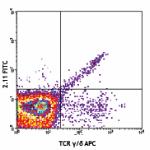
C57BL/6 mouse lymph node cells were stained with anti-mouse ... 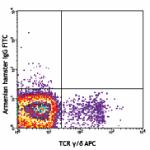
-
PE anti-mouse TCR Vγ1.1/Cr4
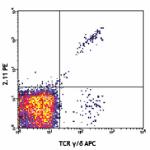
C57BL/6 mouse lymph node cells were stained with anti-mouse ... 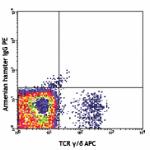
-
Purified anti-mouse TCR Vγ1.1/Cr4

C57BL/6 mouse lymph node cells were stained with anti-mouse ... 
-
APC anti-mouse TCR Vγ1.1/Cr4
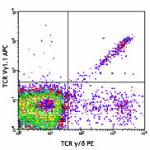
C57BL/6 mouse lymph node cells were stained with TCR γ/δ PE ... 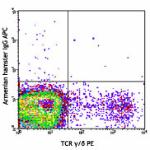
-
Pacific Blue™ anti-mouse TCR Vγ1.1/Cr4

C57BL/6 mouse splenocytes were stained with TCR γ/δ PE and T... -
PerCP/Cyanine5.5 anti-mouse TCR Vγ1.1/Cr4

C57BL/6 mouse splenocytes were stained with TCR γ/&del... -
TotalSeq™-C0209 anti-mouse TCR Vγ1.1/Cr4
-
Brilliant Violet 421™ anti-mouse TCR Vγ1.1/Cr4

C57BL/6 mouse splenocytes were stained with anti-mouse CD3 (... -
Spark Red™ 718 anti-mouse TCR Vγ1.1/Cr4 (Flexi-Fluor™)
-
Spark Blue™ 574 anti-mouse TCR Vγ1.1/Cr4 (Flexi-Fluor™)
-
Spark Blue™ 550 anti-mouse TCR Vγ1.1/Cr4 (Flexi-Fluor™)

 Login / Register
Login / Register 









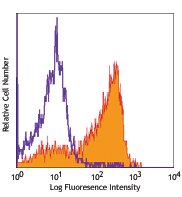
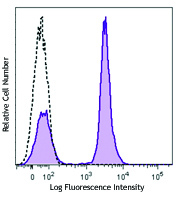
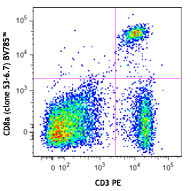
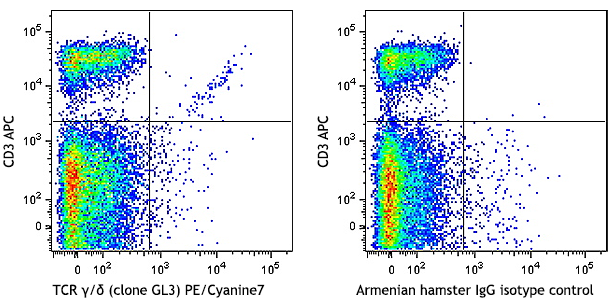



Follow Us